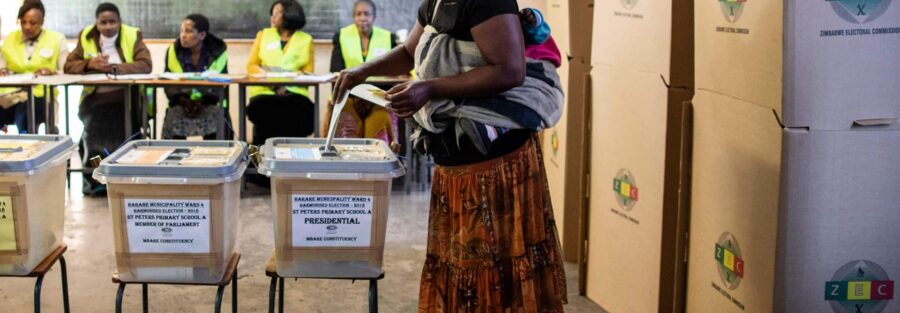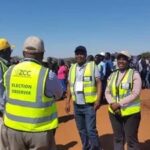ERC Statement on the Pre-election Environment of the 2023 Harmonized Elections 23 August 2023
Introduction
Following the 2018 elections and the reports of various election observer missions/groups, recommendations in the form of reforms were tabled and presented as a draft electoral amendment bill. Sadly, key reforms around enhancing the independence of the election management body, access to public media, the role of traditional leaders, access to the voters roll, amongst others, were not adopted before this poll. This impacted the operating environment.
Guided by the electoral cycle approach, the ERC has been monitoring the electoral environment since the last harmonized elections in 2018. Through research, the ERC makes the observations, including the following, with regard to the pre-election period for the 2023 Harmonized Elections.
Voter Registration
As the Election Management Body conducted continuous voter registration, a sizable number were registered during the mobile registration exercise. Civil society and other stakeholders also contributed through various awareness and voter mobilization campaigns.
Voter Education
Unique to this poll, civil society was invited to apply for accreditation to conduct voter education with only a few being successful while others got their accreditation a few weeks before the polls. This process could have been enhanced had more players been permitted to support the efforts of the Election Management Body in the context of the delimitation process.
Nomination Process
While the call for nominations was made through the proclamation for the harmonized polls, the process encountered difficulties. Potential candidates lamented the high nomination fees, delays at nomination courts, inefficiencies within the payment process/platform as well as recognition of double candidates despite parties submitting official lists. Other potential candidates were removed from the nomination list with some voters arguing that their right to vote for candidates of their choice had been violated. Complaints were also noted with voters who were not accepted as eligible to nominate candidates as they did not appear on the voters roll used during the process yet they were appearing on the online roll. In this election, political parties failed to enhance the participation of marginalized groups including youths, women and people with disabilities as candidates.
Pre-Election Litigation
Linked to the delimitation and nomination processes, numerous court cases were lodged challenging the processes. Given previous surveys indicating low confidence levels with the judiciary, stakeholders and ordinary citizens felt the courts became overly involved in electoral processes in the pre-election period.
Accreditation of Observers
Zimbabwe extended invitations for applications to observe the harmonized polls to locals, regional, international organizations, as well as diplomats and foreign countries. Media was also invited and accredited. The accreditation fees pegged were viewed as too high for locals but despite complaints there was no downwards review of the fees.. This was a welcome move in the spirit of promoting transparency and accountability in the conduct of democratic elections. Sadly, a number of local observers were not accredited with the Election Management Body citing security reasons. As a result of that there was litigation. This unfortunately sent the message that voices that are perceived critical to the Government were considered unpatriotic and therefore a security threat.
Electoral Campaigns
Political parties and independent candidates were generally able to canvass for voters through rallies, door to door and via media platforms. The Zimbabwe Republic Police were seen enforcing the Maintenance of Peace and Order Act (MOPA) with the opposition citing more repression as many of their meetings were banned and organizers arrested. Violence has also been witnessed with life lost, property destroyed and persons injured in this pre-election period. Voter intimidation and disinformation was rampant especially in rural, and peri-urban areas. Vote buying was rampant and illegal under the electoral laws.
Access to Media
While both public and private media provided some coverage for political parties, such coverage was not in full compliance with legal provisions of equality of access. Journalists in some instances were harassed during performance of their duties. The public media remains largely biased towards the ruling party and argues that the opposition was given equal opportunity but for some reasons could not utilize it or pay. The Zimbabwe Media Commission has also been engaged to ensure media coverage is fair.
Legal Framework
The patriotic provisions in the criminal law code which was recently passed served to affect free expression. The provisions, while they were meant to instil a sense of patriotism in the citizenry, have been argued to be vague and imprecise to the extent that they induce self censorship and limit freedom of expression in campaigning. The work of civil society was also broadly impacted by the Private Voluntary Bill which aims to force all non-governmental organizations to register as PVOs.
Concerns have also been raised regarding the use of Statutory Instruments in governing this election, particularly after an election had already been called.
Voters Roll
The law requires that a voters’ roll be in an analysable and searchable format and that parties to an election should be provided with as much information as would enable them to effectively participate in the election. Access to the voters roll was a contested issue (characterized by court cases demanding urgent release of the roll) with the election management body issuing a provisional voters roll for nomination and inspection that key stakeholders argued was not in a format that enables their independent audit. The Election Management Body maintained that the law does not state the format and that they also considered security of the data on the roll.
Stakeholder Engagement
The election is a key process and event within an electoral democracy and stakeholders have to develop confidence in the process and culminating event. This is realized when there is effective stakeholder engagement and representation. The election management body developed an election roadmap to inform and guide stakeholders accordingly, responded to enquiries and considering our input, hosted observer briefings, and accredited most observers. However, with improved direct interface, political parties and civil society disagreements and court cases could have been minimized.
Elections must be viewed as both a process and an event. Efforts must continuously be made to improve the electoral environment in pursuit of electoral excellence.
—————–ENDS——————



